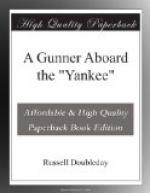It was a shell!
“Whiz! they are coming pretty fast,” remarked Flagg. “That last one didn’t miss us by a dozen yards.”
“This isn’t Santiago shooting,” put in Tommy. “These beggars know how to aim.”
During the next ten minutes the fighting was fast and furious. It was load and fire and load again without cessation. There was the old trouble in regard to the smoke, and half the time we had to aim blindly. Notwithstanding that fact, “Hay” did so well that word came from Captain Brownson complimenting him warmly.
The “Yankee” seemed to be the centre of a series of eruptions. The Spanish shells kept the water continually boiling, and with the splashing of each projectile there would arise a geyser-like fountain accompanied by a muffled explosion which could be plainly felt on board the ship.
[Illustration: “There was temporary confusion”]
It was the first real naval battle experienced by us—the bombardment of Santiago being of an entirely different calibre—and it needed only the grewsome setting of surgeons and wounded and blood to make it complete. That soon came.
We of Number Eight gun were working at our stations, so intent on our duties that the uproar of shot and shell outside claimed little attention, when suddenly there came a louder explosion than usual directly in front of the open port.
There was a blinding flash, a puff of stifling smoke, and then Kennedy, who was just approaching the gun with a shell, staggered back, and almost fell to the deck. Tommy, the first captain, made a gesture as if brushing something from his breast, and then leaped to the injured man’s assistance.
“It was a piece of shell,” cried “Stump.” “It came through the port.”
There was temporary confusion. The surgeon and his assistants came on a run, but before they could reach the spot, Kennedy recovered and advanced to meet them. He presented a horrible spectacle, with his face and neck and body spattered with blood, and we who were nearest saw that he had been frightfully wounded in the left shoulder.
Notwithstanding that fact, he remained cool and steady, and never made the slightest indication that he was suffering. When he finally disappeared down the berth-deck ladder we exchanged glances of surprise and sympathy.
“That isn’t Kennedy,” murmured “Stump,” softly.
“We didn’t know him after all,” said “Hay.” “Poor devil! I hope he isn’t badly injured.”
“He has been in the hardest kind of luck since we left New York,” spoke up Tommy. “Seasick half the time, always in trouble, and bucking against homesickness and everything else. And now he has to be wounded. It’s a shame.”
Our thoughts were with our comrade as we served the gun, and when word came a few moments later that he was doing fairly well, we could hardly repress a cheer.
There was little time, however, for displaying emotion. We were right in the thick of the fight, and the “Yankee’s” battery was being worked to the limit. It seemed as if the air fairly reeled with the noise and clamor of combat. Shells buzzed and shrieked about us, and smoke gathered in thick, stifling clouds all about the ship.




